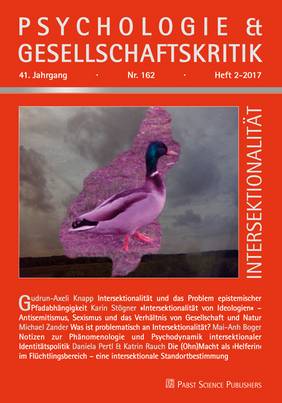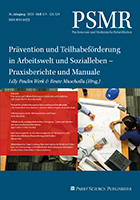Gudrun-Axeli Knapp
Intersektionalität und das Problem epistemischer Pfadabhängigkeit
Zusammenfassung | Abstract
Karin Stögner
»Intersektionalität von Ideologien« - Antisemitismus, Sexismus und das Verhältnis von Gesellschaft und Natur
Zusammenfassung | Abstract
Michael Zander
Was ist problematisch an Intersektionalität?
Zusammenfassung | Abstract
Mai-Anh Boger
Notizen zur Phänomenologie und Psychodynamik intersektionaler Identitätspolitik
Zusammenfassung | Abstract
Daniela Pertl & Katrin Rauch
Die (Ohn)Macht als Helferin im Flüchtlingsbereich - eine intersektionale Standortbestimmung
Zusammenfassung | Abstract
Intersektionalität und das Problem epistemischer Pfadabhängigkeit
Gudrun-Axeli Knapp
»Intersektionalität« ist ein aus dem amerikanischen Black Feminism stammendes Konzept, das Probleme der Mehrfachdiskriminierung bzw. des Zusammenhangs zwischen verschiedenen Formen von Herrschaft und Ungleichheit bezeichnet. Im Mittelpunkt des Beitrags steht die Frage, in welchen theoretischen Rahmungen intersektionelle Perspektiven fruchtbar gemacht worden sind. Ausgehend vom Ansatz der Juristin Kimberlé Crenshaw, auf die der Terminus »Intersectionality« zurückgeführt wird, wird exemplarisch seine Aufnahme und Weiterentwicklung in der Kognitiven Sozialpsychologie dargestellt, um im Weiteren nach den Übersetzungsmöglichkeiten dieses Konzepts in interaktionistische bzw. psychoanalytische Theorierahmen zu fragen. Anhand der systematischen Schwierigkeiten, auf die diese Übersetzungsarbeit stößt, wird das Problem epistemischer Pfadabhängigkeit eingeführt und veranschaulicht.
Schlüsselwörter: Intersektionalität, Mehrfachdiskriminierung, Ungleichheit, Theorievergleich, Epistemische Pfadabhängigkeit
Intersectionality and the Problem of Epistemic Path Dependency
»Intersectionality« refers to a concept developed by Black Feminists to help tackle the problems of multiple discrimination and interlocking forms of oppression and inequality. The chapter centers on the theoretical framings in which intersectional perspectives have been applied most productively. Starting with the conceptualization of Kimberlé Crenshaw, who initially introduced the term, the paper takes an exemplary look at re-formulations of intersectionality within Cognitive Social Psychology. Against this background it asks if and how the concept can be fruitfully translated into other theoretical frameworks such as Interactionism or Psychoanalytic Theory. By discussing some systematic difficulties of such an endeavor, the problem of epistemic path dependency is introduced and illustrated.
Keywords: Intersectionality, Multiple Discrimination, Inequality, Methodology, Epistemic Path Dependency
Gudrun-Axeli Knapp
axeli.knapp@sozpsy.uni-hannover.de
»Intersektionalität von Ideologien« - Antisemitismus, Sexismus und das Verhältnis von Gesellschaft und Natur
Karin Stögner
Dieser Beitrag geht von der Beobachtung aus, dass unterschiedliche Ideologien in Diskurs und Praxis sich gegenseitig durchdringen und verstärken und sich so als prozesshafte soziale Phänomene über den sozialen und historischen Wandel hinweg beständig reproduzieren und reaktivieren. Dieses Phänomen, das ich die »Intersektionalität von Ideologien« nenne, möchte ich anhand des Ineinandergreifens von Antisemitismus und Sexismus behandeln und am dialektischen Verhältnis von Gesellschaft, Individuum und Natur auffalten. Damit öffnen sich neue Perspektiven für die Intersektionalitätsforschung, indem nicht auf Identitätspolitiken, sondern auf die strukturelle Ebene der Ideologiebildung geblickt wird. Während herkömmliche Zugänge zur Intersektionalität den Antisemitismus vielfach ausschließen, begreift eine Intersektionalität von Ideologien den Antisemitismus als die intersektionale Ideologie schlechthin, indem sie sichtbar macht, dass die Wirkmächtigkeit des Antisemitismus als verquere Welterklärung auch von seiner Durchdringung durch andere Ideologien wie Sexismus, Rassismus und Nationalismus herrührt.
Keywords: Antisemitismus, Sexismus, Ideologiekritik, Intersektionalität, Kritische Theorie
»Intersectionality of ideologies« - Antisemitism, sexism, and the relationship of society and nature
This article starts from the observation that different ideologies permeate and enforce each other in discourse and praxis. Ideologies are understood as processual social phenomena that are constantly reproduced and reactivated across social and historical change exactly by intermingling with other ideologies. I will explicate this »intersectionality of ideologies« via a thorough analysis of how antisemitism intermingles with sexism and will unfold the dialectical relationship of society, individual and nature that is operative throughout the problem. Regarding intersectionality research this approach implies a shift in perspective: instead of identity politics the structural level of ideology formation comes into view. The problem with popular approaches to intersectionality is that antisemitism often tends to be excluded from analysis. An intersectionality of ideologies stands in marked contrast to such tendencies and views antisemitism as the intersectional ideology par excellence. The specific intersectional analysis reveals that the efficiency of antisemitism as a distorted explanation of the world arises remarkably from being permeated by other ideologies like sexism, racism and nationalism.
Keywords: antisemitism, sexism, ideology critique, intersectionality, Critical Theory
Karin Stögner
karin.stoegner@univie.ac.at
Was ist problematisch an Intersektionalität?
Michael Zander
Wenngleich die wissenschaftliche und politische Relevanz von Mehrfachdiskriminierungen anzuerkennen ist, hinterfragt der vorliegende Artikel aktuelle Ansätze und Ansprüche der Intersektionalitätsforschung. Insbesondere wird gezeigt, dass die Sozialstrukturanalysen unzulänglich und eklektisch ausfallen, weil sie die kapitalistische Produktionsweise nicht angemessen berücksichtigen. Außerdem wird das Konzept des Privilegs kritisiert, wie es in der Intersektionalitätsforschung verwendet wird, weil es individuelle Rechte mit Vorteilen und Struktureffekte mit persönlichen Eigenschaften vermengt. Am Beispiel von Klassismus und Ableismus wird dargestellt, wie die Intersektionalitätsforschung komplexe Forschungsgegenstände auf Diskriminierung reduziert. Schließlich problematisiert der Beitrag, dass Intersektionalität, ebenso wie Social Justice, im Liberalismus verwurzelt ist.
Schlüsselwörter: Kritik der Intersektionalitätsforschung, kapitalistische Produktionsweise, Diskriminierung, Privilegientheorie, Liberalismus
What is problematic about intersectionality?
While acknowledging the scientific and political relevance of intersecting forms of discrimination, the article questions current approaches and claims of intersectionality research. Especially the analysis of social structures is shown to be deficient and eclectic for it does not take into account the capitalist mode of production in a proper way. Furthermore, the concept of privilege as used in intersectionality research is criticized for confusing individual rights with advantage and structural effects with personal traits. Using the examples of classism and ableism it is pointed out how intersectionality research reduces complex objects of research to discrimination. Finally, the essay uncovers that intersecionality research as well as concepts of social justice are rooted in liberalism.
Keywords: critique of intersectionality research, capitalist mode of production, discrimination, privilege theory, liberalism
Michael Zander
michael.zander@hs-magdeburg.de
Notizen zur Phänomenologie und Psychodynamik intersektionaler Identitätspolitik
Mai-Anh Boger
Der vorliegende Aufsatz geht aktuellen Aporien intersektionaler Zugänge nach, indem er aus einer Phänomenologie der aktivistischen Praxis heraus nachzeichnet, wie Subjekte in diesem Diskurs adressiert werden und wie dies Bewegungen verändert. Der Einsatzpunkt Kritischer Psychologie wird dabei verstanden als einer, der in der Lage ist, derzeit virulente Opferinszenierungen, Konkurrenzverhältnisse und Konfliktpotentiale zu verstehen. Ziel ist eine Betrachtung von Bündnismöglichkeiten und Handlungsspielräumen jenseits von Entsolidarisierung und Selbstpartikularisierung, sowie eine Überwindung von Selbstlimitationen.
Schlüsselwörter: Intersektionalität, Bündnispolitik, Opferdynamik, Hauptwiderspruch
Notes on Phenomenology and Psychodynamics of Intersectional Identity Politics
In this paper phenomenology is used as a link between philosophical and introspective reasoning to analyze intersectional movements and their praxis. It aims at an understanding of how the intersectional wording has impacted the self-understanding of addressed subjects and the further development of critical movements. Critical Psychology can be helpful to examine and overcome phenomena of victimization, entitlement victimhood and other prevailing abuses of intersectionality. It hence focuses on multiplied alliances instead of multiple identities and seeks to reinvent forms of cross-category and non-category solidarity.
Keywords: intersectionality, alliance, solidarity, victimization, phenomenology
Mai-Anh Boger
mai-anh.boger@uni-bielefeld.de
Die (Ohn)Macht als »Helferin« im Flüchtlingsbereich - eine intersektionale Standortbestimmung
Daniela Pertl & Katrin Rauch
Im vorliegenden Beitrag werden wir - eine intersektionale Perspektiveneinstellung einnehmend - eine Rekonstruktion der eigenen Identität als PsychologInnen und HelferInnen in der Begegnung mit Flüchtlingsjugendlichen durchführen. Hierfür skizzieren wir zunächst das »Asylregime« in Österreich, welches unser Tun als PsychologInnen in einer NGO maßgeblich bestimmt. Mit einer historischen Rahmung der Ursprünge sozialer Arbeit als ArbeiterInnenkampf führen wir schließlich die von Karam Khella entwickelte Unterscheidung zwischen einer »Sozialarbeit von oben« versus einer »Sozialarbeit von unten« ein. Danach arbeiten wir anhand von Erfahrungen aus unserem Arbeitskontext im Flüchtlingsbereich heraus, wie eine intersektionale Perspektiveneinnahme als Sensibilisierungsinstrument dabei hilfreich sein kann, unsere eigene intersektionale Verflechtung in diesen Herrschafts- und Machtstrukturen zu reflektieren, um anschließend (neue) Handlungsmöglichkeiten mit Methoden der dialogischen Sensibilisierung nach Freire ausloten zu können, die einer »Sozialarbeit von unten« entsprechen.
Schlüsselwörter: Flüchtlinge, Intersektionalität, Sozialarbeit von unten, Asylregime, Empowerment
The (lack of) power as professionals in social work with minor refugees - an intersectional analysis
In the following article we reconstruct our own identity as psychologists and professionals in the psychosocial field with minor refugees by means of race, class and gender. In the first place we will discuss our own entanglement in the so-called »Asylregime« in a non-profit organisation. Herefore we distinguish between »social work from above« and »social work from below« (Karam Khella) based on the historic development oft he discipline. By means of an intersectional analysis of our work experiences we will underline the importance of these concepts for understanding each others involvement in power relations. Finally we will discuss methods of »sentizising« (Paulo Freire) to develop agency for both - for our clients and for us as professionals.
Keywords: refugees, asylum seekers, intersectionality, social work from above, agency.
Daniela Pertl
daniela.pertl@sfu.ac.at
Katrin Rauch
katrin.rauch@sfu.ac.at























